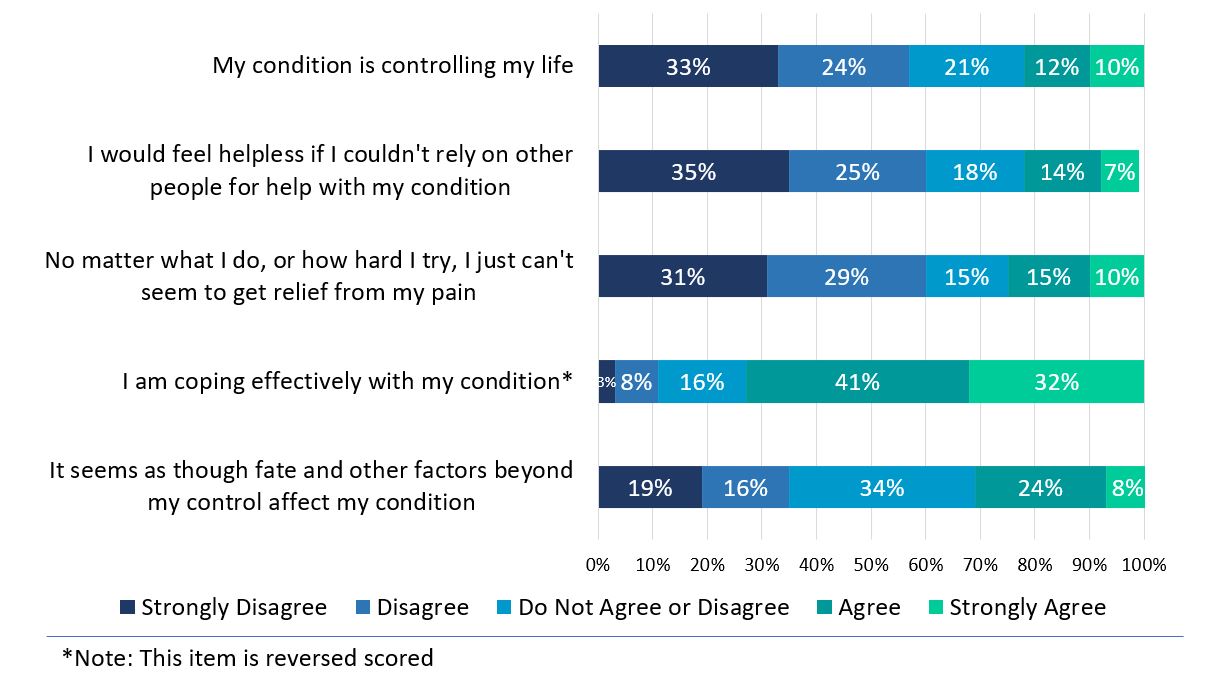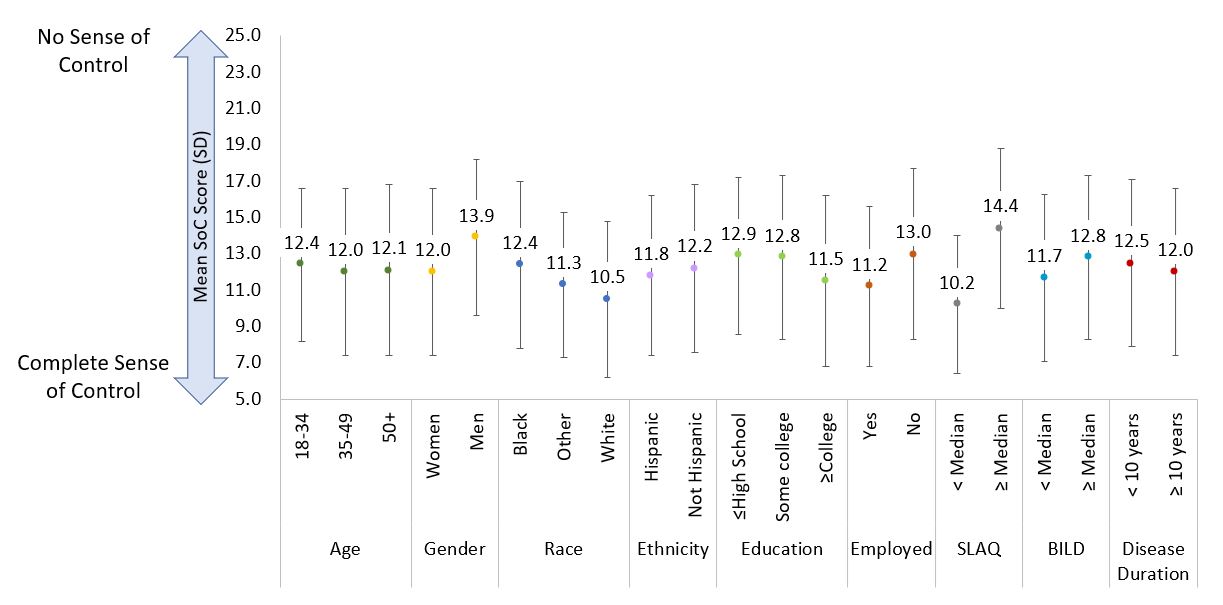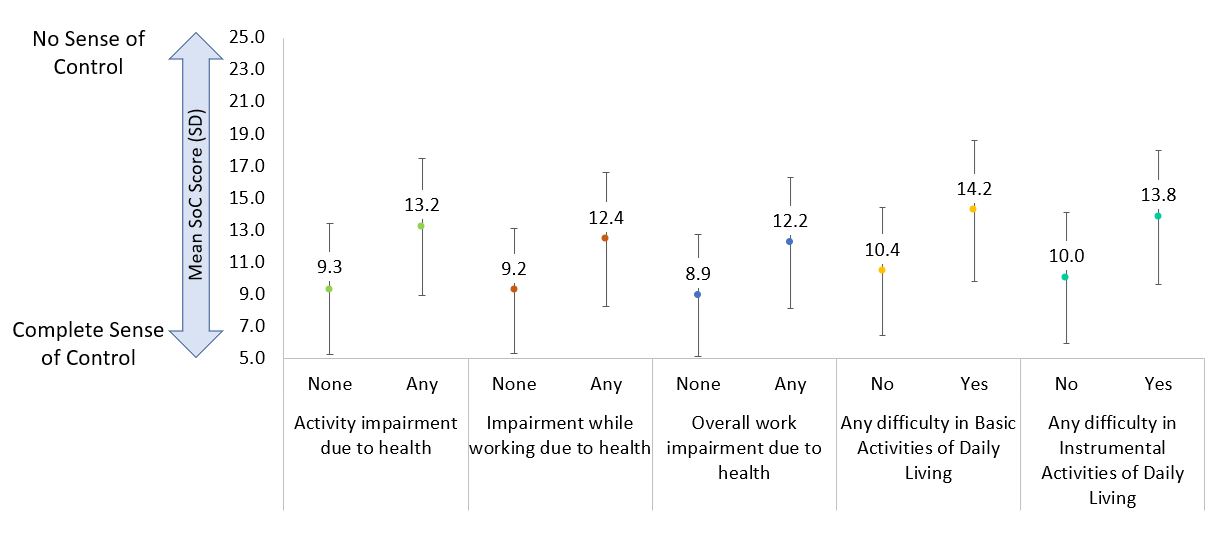Session Information
Session Type: Poster Session A
Session Time: 10:30AM-12:30PM
Background/Purpose: SLE is a disease characterized by cycles of remitting and relapsing symptoms that can be unpredictable, stressful, and cause an individual to feel they are unable to gain control over their life or their disease. We sought to determine the association of these feelings of sense of control (SoC) with work productivity and activities of daily living in a cohort of patients with SLE.
Methods: Individuals with SLE (ACR criteria confirmed by a rheumatologist) were recruited from an ongoing population-based cohort in metropolitan Atlanta. Participants completed a cross-sectional survey (10/2019-5/2022), which included the Learned Helplessness (LH) subscale of the Rheumatology Attitudes Index, Work Productivity and Activity Index, Basic Activities of Daily Living (ADL), Instrumental ADL, Systemic Lupus Activity Questionnaire (SLAQ), and the Brief Index of Lupus Damage (BILD). The LH subscale was used to characterize “sense of control” and includes 5 Likert-scale questions with a total score ranging from 5 to 25, with higher SoC scores indicating less sense of control. Generalized linear regression models estimated the association between SoC and continuous outcomes of interest. Multivariable logistic regression estimated the association of SoC and any difficulty in ADL. All models were adjusted for age, race, gender, and depression.
Results: The study included 429 participants with SLE; 92% female, 82% Black, 6% Hispanic, mean age 46 years, mean disease duration 16.5 years, 53% currently unemployed, 22% high school education or less, mean SLAQ: 12 (SD: 7.5). About 21-32% said they agreed or strongly agreed their condition is controlling their life, they would feel helpless if they could not rely on others for help, they cannot get relief from pain, and that fate and other factors beyond their control affect their condition (Figure 1). Overall, the average SoC score was 12.1 (SD: 4.6); scores were higher, indicating less SoC, for men, Black participants, participants with lower education, participants who were not employed, participants with higher patient-reported disease activity, and participants with more patient-reported SLE disease damage (Figure 2). Additionally, SoC scores were higher for participants with any work productivity impairment due to their health or participants with any difficulty performing basic or instrumental ADL (Figure 2). After adjustment, less SoC was associated with lower work productivity, with more time missed due to health (β: 1.08; 95% CI: 0.23, 1.94) and more impairment while working due to health (β: 2.78; 95% CI: 1.82, 3.73). Additionally, we observed greater odds of difficulty performing basic ADL (OR: 1.21; 95% CI: 1.14, 1.29) and instrumental ADL (OR: 1.21; 95% CI: 1.14, 1.29) with higher SoC scores.
Conclusion: We found that higher scores for SoC were more common in men and those who were Black, had lower educational attainment, or who had greater disease activity, indicating worse SoC in these participants. Further, higher SoC scores were associated with lower work productivity and lower ability to perform activities of daily living. Awareness of SoC in patients with SLE and support to improve SoC is essential to improving quality of life in this patient population.
To cite this abstract in AMA style:
Eudy A, Lim S, Dunlop-Thomas C, Yazdany J, Katz P, Plantinga L. Impact of Sense of Control Among People Living with SLE [abstract]. Arthritis Rheumatol. 2024; 76 (suppl 9). https://acrabstracts.org/abstract/impact-of-sense-of-control-among-people-living-with-sle/. Accessed .« Back to ACR Convergence 2024
ACR Meeting Abstracts - https://acrabstracts.org/abstract/impact-of-sense-of-control-among-people-living-with-sle/



